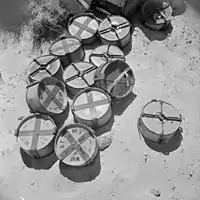A.T. Mine G.S. Mark V
The Anti-Tank Mine, General Service, Mk V was a cylindrical, metal-cased United Kingdom anti-tank blast mine that entered service in 1943, during the Second World War.[2] [3]It was replaced in British service with the Mk 7 mine. Two versions of the mine were produced, the Mk. V and the Mk. VC with the same external dimensions. The only difference was that the Mk. VC had a half-sized explosive charge.
| Anti Tank Mine. G.S. Mark V | |
|---|---|
 Mark V GS Mines, about to be laid in Egypt, 2 July 1942 | |
| Type | anti-tank mine |
| Place of origin | United Kingdom |
| Service history | |
| Wars | World War II |
| Production history | |
| Variants |
|
| Specifications | |
| Mass |
|
| Height | 4 inches (100 mm) |
| Diameter | 8 inches (200 mm)[1] |
| Filling | TNT or Baratol[1] |
| Filling weight |
|
Detonation mechanism | Pressure activated, shear-pin fuze (350 pounds (160 kg) of pressure) |
The mine used a spider pressure plate that makes it resistant to blast overpressure. The spider rests on a central Mk 3 fuse (sometimes referred to as No.3 Mk I), which contains a spring-loaded striker held in place by a shear pin. The mine, being made largely of steel tended to rust making its activation unpredictable.
It is found in Angola, Egypt, Jordan, Libya, Mozambique, Sudan, and Zimbabwe.
Variants
- Mine G.S. Mk VC (general service version)
- Mine G.S. Mk V
References
- Citations
- Ordnance Pamphlet 1665 (1946) p.402
- "USNBD, British Landmines, Fuzes and firing Devices; Section I - A/Tk Mines & Fuzes: A/Tk Mine G.S. Mk V". michaelhiske.de. Retrieved 31 January 2021.
- "British Mines of the Second World War". www.wwiiequipment.com. Retrieved 31 January 2021.
- Bibliography
- British Explosive Ordnance (PDF) (Report). Ordnance Pamphlet. Department of the Navy, Ordnance Systems Command. 10 June 1946. OCLC 51810278. NAVORD OP 1665. Archived (PDF) from the original on 4 March 2016.
- Jane's Mines and Mine Clearance 2005-2006
- NAVORD OP 1665, British Explosive Ordnance, Naval Ordnance Systems Command (Updated 1970)